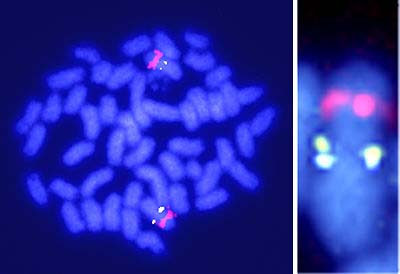 "I think [the study is] very cool," said Ronald See at the Medical University of South Carolina, who was not involved in this research. The investigators have established a simple method for teasing out sex and hormonal differences that can now be applied to behavioral tests, he said.
"I think [the study is] very cool," said Ronald See at the Medical University of South Carolina, who was not involved in this research. The investigators have established a simple method for teasing out sex and hormonal differences that can now be applied to behavioral tests, he said.
Sex differences in addictive behavior, long linked to female hormones, may also be driven by genetic factors, according to a new study published online in Nature Neuroscience.
A now-classic study that compared male and female responses to cocaine showed that females were more sensitive to the drug's reward effects during the estrus phase of their menstrual cycle, establishing the theory that hormone levels influence addictive behavior. But the contribution of sex chromosomes was not previously examined because there was no technique for separating hormonal factors from genetic ones.
Jane Taylor of Yale University and colleagues identified a naturally occurring mutant mouse in which males lacked a gene on the Y chromosome called SRY that is responsible for the formation of testes. These mutants, while chromosomally male, did not develop testes. The researchers then inserted the SRY gene onto an autosomal chromosome of a mutant male -- which developed normal testes -- and crossed that animal with a normal female. The resulting strain consisted of four phenotypes: genetic males with testes; genetic males with ovaries; genetic females with ovaries; and genetic females with testes.
"Until this mouse model we didn't have a way of addressing this issue," first author Jennifer Quinn, also from Yale, told The Scientist.
The researchers examined the speed with which the gonad-crossed mice formed a habitual behavior in response to food. The mice were trained to poke their noses in one of three holes in order to receive food. But when they were taught that the food was no longer tasty, genetically female mice -- regardless of their gonadal status -- continued the nose-poking behavior out of habit, even though they stopped eating the food. (When trained long enough, all four phenotypes developed the habit.)
The study doesn't contradict the body of data that implicates hormones like estrogen and progesterone in addictive behaviors, said Quinn, but it is the first demonstration there may be a sex-linked genetic component as well.
Teasing out addictive behaviors that are more strongly associated with sex-related genes could allow scientists to look for specific X-linked or Y-linked genes that could be targets for addiction therapies, said Quinn.
But she added that the study only indirectly addressed addiction behavior, since the researchers used a food response rather than a drug of abuse. While she plans to test responses to drugs of abuse using this experimental model, she said the results suggest that depression and conditions such as Tourette's syndrome, which have components of compulsive behavior, might also be affected by sex chromosomes.
Wendy Lynch from the University of Virginia, who was not involved in the study, said the research addressed a component of addiction that hasn't been given much attention. Most studies on drug addiction have focused on the initial reward -- the euphoric feeling -- that comes with satisfying a craving, but this work instead looked at habitual or compulsive behavior that contributes to addiction but often sets in later.
The results give a "hint or suggestion that females could develop compulsive behavior faster," Lynch said.
"It could certainly have implications on how learning [in general] takes place," as well as other motivation behaviors, See said.
"It really makes you wonder what else might be going on here," said Lynch. "I think there's going to be a lot of work that follows on this. I think it's going to be exciting."


No comments:
Post a Comment